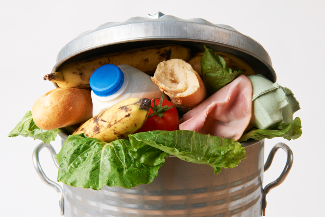Member State Page : Belgium
Last updated on the 26/05/2025

Flanders: 3,485,000 tonnes in 2015
Wallonia: 2,550,649 tonnes in 2015
In total: 1 758 589 tonnes in 2022

Flanders: 37 kg/year/person households
Wallonia: 33.8 kg/year/person households (edible fraction only)

Flanders: Reduce food waste by 30% by 2025 Wallonia: Reduce food losses and food waste across the food supply chain by 30% by 2025 Brussels region: Reduce household waste by 40% & canteen waste by 40% by 2020
Target
Through the food supply chain roadmap on food loss 2020, the Government of Flanders worked together with the entire food supply chain to reduce food waste in Flanders by 15%. The interim monitoring (2019) provides an insight into the efficiency with which the agri-food chain dealt with raw food materials in 2017. A new food waste prevention plan is part of the action plan circular food losses and biomass (residues) 2021-2025. The long-term objective is to reduce food waste in Flanders by 30% by 2025.
In Wallonia, the objective set is to reduce food losses and food waste across the food supply chain by 30% by 2025.
For the Brussels region, the goal set under the ‘Good Food strategy 2’ is to reduce food waste across the food supply chain by 30% by 2025 and by 50% by 2030.
Measure
In Belgium, estimations on food waste are available; however, there are certain gaps where further studies are needed. The Public Waste Agency of Flanders (OVAM) coordinates the reporting on food waste levels for the entire country.
In the Flemish agri-food chain, from harvest to consumption, an estimated 3,485,000 tonnes of food waste were generated in 2015 (the baseline year against which progress is monitored). This covers both edible (907,000 tonnes) and inedible, unavoidable food waste (2,578,000 tonnes); the latter represents three quarters (74%) of the total amount of food waste. 92% of all food waste is valorised, mostly as animal feed (43% of all food waste), followed by anaerobic digestion (21%) and soil (17%).
A study commissioned by the Flemish Department of Environment assessed the amount of edible food waste at household level in Belgium, between 2016 and 2018. On average, 1.7 kg of food and drink were thrown away each week per household. For Flanders, this amounts to an average of 37 kg of food per year and per inhabitant. The study also offered a better insight into the key drivers underlying consumer food waste.
Flanders has also been monitoring food losses in the primary production sector, publishing related data in its state of play report (2019).
Act
In Belgium, both the federal level and the three regions (Flanders, Wallonia and Brussels) have competencies that relate to food waste.
At federal level, the Federal Agency for the Safety of the Food Chain has drawn up a circular letter regarding Food Donations (link below). This circular letter provides guidelines for determining suitablily of food for donation, freezing food intended for donation, transport and receipt of donated food, labelling of donated food, ... The circular letter also includes a non-exhaustive list of foodstuffs and their shelf lives once they have reached/passed their best before date.
In Flanders, the food supply chain roadmap on food loss 2020 was launched in April 2015. The roadmap includes objectives and actions for all the stages of the food supply chain, consisting of 9 action programmes and 57 related actions:
- Supporting companies in reducing food losses and waste;
- Collaboration in the food supply chain;
- Awareness-raising, inspiration and commitment at company level;
- Training employees to promote food loss reduction;
- Awareness-raising, inspiration and commitment at consumer level;
- Building new business models for collaboration between the regular and the social economy;
- Promoting and facilitating the donation of food surpluses;
- Investing in research;
- Monitoring food losses and food waste.
The Government of Flanders is working on developing an integrated Flemish food policy, by collaborating with all the relevant policy areas and stakeholders. The action plan circular food losses and biomass (residual) flows 2021-2025 includes a new food waste prevention plan with measures that cut across the food supply chain, with the aim to develop a circular food system. Circular projects, some of which focus on the revalorisation of food waste streams, are financed through ‘Circular Flanders’. The Flemish climate action plan 2021-2030 also incorporates food waste prevention actions.
Companies are obliged to separately sort and collect organic waste starting 2021.
Awareness raising activities concerning food waste in Flanders include pilot projects in schools carried out in collaboration with non-profit and private organisations, on-line information for teachers and students (e.g. the educational package Kostbare Kost), a campaign on the separate collection of organic waste by OVAM, training and guidance materials for stakeholders etc.
In Wallonia, the REGAL plan has specifically addressed the issue of food losses and food waste in the region since 2015, with a new version of the programme for 2015-2025 adopted by the Walloon Government in 2018. The REGAL plan 2.0 focuses on five main areas and is divided into 17 measures, which cover awareness raising activities, measures to engage actors across the food supply chain and to support their actions against food losses and waste, as well as monitoring and research initiatives. An assessment of the implementation of the different measures foreseen under the REGAL plan 2.0 was made in February 2019.
The REGAL plan 2.0 sets out several actions to support food redistribution, such as to increase the use of digital food redistribution platforms (e.g. Bourse aux dons, Soli-Dons, etc.), to improve the food donation legal framework etc. Food donations are facilitated by legal measures such as a VAT exemption for the donated goods, or the decree on environmental permits, which promotes the distribution of unsold, edible food from supermarkets to food aid associations.
Measures against food losses and food waste are also included in the Walloon waste and resources plan and the Walloon sustainable development strategy (in particular, the Manger demain strategy for a sustainable food system).
The Regal plan 2.0 foresees that the topic of food waste be included in compulsory education and in professional training related to food. Canteen staff have been offered on-site training on how to avoid food waste as part of the Manger demain initiative and the Green Deal for sustainable canteens.
A barometer study on waste carried out by the Walloon Government in 2018 assessed the generation of food waste at household level. Tips for consumers on how to avoid food waste when going to the grocery store can be found on the webpage of the Walloon regional authorities.
In Brussels, the ‘Good Food strategy 2' (2022-2030), co-constructed with relevant stakeholders, includes two main action areas to reduce food waste : to prevent food waste at source across the food supply chain and to stimulate the development of projects for processing food surplruses for human consumption.
Under this strategy, Canteens wishing to obtain the 'Good Food canteen label' must measure their food waste annually. Restaurants wishing to obtain the ‘Good Food restaurant label’ may choose to complete an annual food waste measurement criteria, in order to achieve a higher score.
An action plan is currently being drawn up to launch an awareness-raising campaign aimed at households, accompanied by actions supported by relay stakeholders and the development of tools to help them reduce their waste, as well as to support professionals in reducing their food waste.
Since January 2016, the obligation to donate food that operators no longer wish to market but which are still consumable has been introduced in the environmental permits issued by Bruxelles Environnement, for large food stores with a total surface area equal to or greater than 1,000 m². Representatives of the trade sector such as Comeos, UCM/Aplsia and UNIZO have pledged to promote food donation to their members. A project of law is on the drawing board to force supermarkets to give away their leftovers.
Professionals can get free support from our biowaste facilitator to reduce their waste, including food waste. Events and stands are organized to raise awareness among households of the need to prevent food waste, and a project is underway to support social housing in reducing its food waste.
The Brussels region offers support to school projects concerning the environment, fot example with the project "Opération recyclons", a free, long-term support to schools to reduce their waste, including food waste.
Relevant resources
Links
